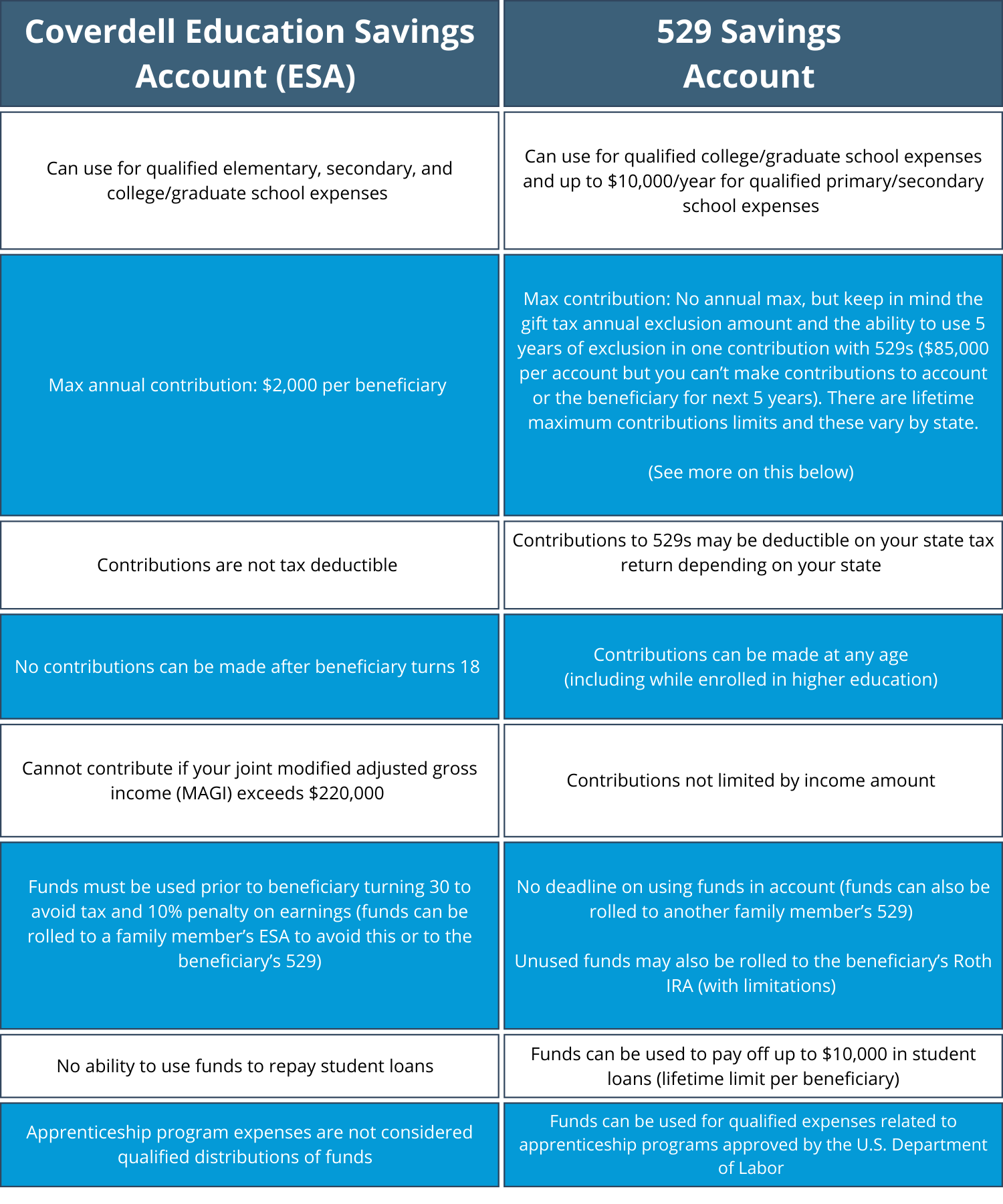Monument Wealth Management Articles
What are My College Savings Options? Answers from a Private Wealth Advisor

Share on your favorite platform, or by email
Have you seen the price for private and even public universities lately? If so, it’s likely you experienced a bit of sticker shock.
The national average net price increase for the cost of attendance is bordering on 5% for both private and public universities in recent years, so this is a common challenge many families are facing. Despite the temptation to bury your head in the sand it’s worth facing the fact that college is still very much worth the investment.
Consider these facts about college grads:
- College grads earn an average of $1 million more over their lifetime than their non-degree peers
- The unemployment rate for college grads is about half that of those without degrees
- Studies show that college graduates live healthier lives (including less heart disease and type 2 diabetes)
- College grads are less likely to get divorced (which can be a financial setback)
And while there is a cost (read: investment) to reaping these benefits, the good news is that there are tax-advantaged accounts that can be leveraged to reach your education funding goals in a financially savvy way. And the sooner you get started, the better.
It starts with understanding your options for education savings accounts.
What are the different types of education savings accounts?
The three primary types of education accounts are:
Prepaid Tuition 529 plans
Prepaid Tuition 529’s are offered by a small handful of states and allow you to purchase credits or units at today’s prices for future use at in-state public schools. There are also some options for private universities that participate as members in a pre-paid plan. When it’s time for your child to attend college in the future, their tuition is covered at the pre-agreed rate, regardless of price increases. This removes tuition inflation risk and investment risk from the picture for parents who choose these plans. That’s great news for parents and bad news for the states that sponsor these plans given the guarantees they make – many states are freezing existing plans and not allowing new enrollment.
The downside to these plans is that they are tied to specific institutions or university systems and are often only available to residents of the state where the school is located in the case of state-based plans. If your child opts to attend a private university or out of state school and you’ve purchased credits in a state plan, you’re responsible for the difference between the current cost and the prepaid benefit. It’s also important to note that these funds can only be used to cover tuition and fees, not expenses like room and board or textbooks – so you’ll still need to budget for these types of expenses when enrollment time comes around.
As a wealth advisor who’s worked with countless families exploring education funding strategies, my professional opinion is that prepaid tuition 529s rarely make sense as the sole option (if they are even available), as they take away a LOT of flexibility. 529 Savings Accounts, on the other hand, trade price certainty for increased flexibility.
529 Savings Accounts
529’s let you save for various education expenses – tuition, room and board, and more – without tying you to specific schools or state systems. You can invest the funds in the account for growth over time, investment gains compound tax-free over time, and withdrawals including investment gains are tax-free when the funds are used for qualified education expenses. While contributions aren’t federally tax deductible, some states offer tax incentives to residents who choose to invest in their plan. Virginia, for example, allows residents to deduct contributions up to $4,000 per beneficiary per year from their state income taxes, with an unlimited carryforward (married couples could deduct $8,000/year if each spouse owns and contributes to an account for the same beneficiary). You may participate in any state’s plan (some are better than others! Be sure to compare investment options, expenses and potential tax benefits) and you’re not limited to using the funds in any one state. If funds are taken out for non-qualified expenses however, you’ll owe income tax and a 10% penalty on your investment gains. 529’s also come with the added benefit that unused funds may be rolled over into the beneficiary’s Roth IRA (with limitations).
Coverdell ESAs
Coverall ESAs offer similar benefits to 529 Savings Accounts, but they have slightly more restrictive rules when it comes to eligibility and contribution limits. Check out how they compare on important points in the chart below.
Should I choose a Coverdell ESA or 529 Savings Account?

Should I open an account for education savings through an advisor?
While there is a lot of value in working with an advisor to strategize on education funding – things like figuring out how much and when to contribute to various accounts, how your financial aid may be impacted by different decisions, how to best manage cash flow during enrollment years (particularly if they align with your early years of retirement), and determining the appropriate investment allocation given your time horizon and risk tolerance – advisor-sold 529 plans are generally NOT the move.
Direct sold 529 plans allow you to open an account directly with a state-sponsored 529 plan and manage your own investment allocation, as opposed to signing up for a 529 plan through a financial advisor who manages the allocation for you. This tends to be more affordable from a fee perspective. Not only do you bypass an advisory fee charged on the account, but the investments themselves tend to have lower embedded costs. Advisor-managed plans skew towards more actively managed investment funds, which come with higher expense ratios than the index fund options typically utilized in direct-sold age-based portfolios.
How much can I contribute to a 529 Account?
There are no annual contribution limits to 529 accounts; however, there are maximum aggregate contribution limits after which no additional contributions can be made to the account. These vary by state but fall anywhere between $235,000 (Georgia and Mississippi) and $550,000 (Missouri).
While they don’t fall under the umbrella of contribution limits, there are two important numbers to be aware of when making contributions to accounts for education savings: the lifetime gift tax exemption amount, and the annual federal gift tax exclusion amount.
1 – The lifetime gift tax exemption amount refers to the amount of money you can give away throughout your lifetime and at death without having to pay the federal gift tax. It is currently $12.92 million in 2023, though the exemption amount is set to significantly decrease in 2026 to $5 million (adjusted for inflation).
The IRS tracks the gifts you give against this lifetime exemption amount on Form 709, also known as a gift tax return. But not everyone who gifts to others will need to file a gift tax return each year. That’s because gifts under the annual federal gift tax exclusion amount do not need to be reported to the IRS and do not count against your lifetime exemption amount.
2 – The annual federal gift tax exclusion amount is set by the IRS each year – for 2023, this amount is $17,000 per person. This means you can gift up to $17,000 in a year to anyone without needing to file a gift tax return. If you gift more than $17,000 to someone in one year, the excess gets reported on your gift tax return and is subtracted from your lifetime gift tax exemption amount.
It’s important to note that filing a gift tax return doesn’t necessarily mean you owe any taxes on the transfer. Gift taxes aren’t owed until someone exhausts their lifetime exemption amount, and only applies to gifts given after that point.
How does the annual gift tax exclusion apply to funding a 529 account?
The annual gift tax exclusion amount is important when thinking about how much to fund a 529 for future education expenses. If you want to avoid filing a gift tax return, you’ll need to keep your annual contributions below $17,000 ($34,000 for married couples filing jointly). If you contribute more than $17,000 to a 529 for a single child in one year, you can either opt to have the excess amount counted against your lifetime exemption, or you can opt for five-year gift tax averaging treatment.
What is five-year gift tax averaging (aka “super funding”)?
Recognizing the importance of saving for education, the IRS allows you to accelerate gifting to a 529 without impacting your lifetime exemption amount though the use of five-year gift tax averaging (also known as “super funding”). By electing this treatment on your gift tax return, you’re able to contribute $85,000 in 2023 ($17,000 x 5 years) to a 529 in one year so long as you do not make any additional contributions to the 529 for the next five years and do not do any other annual gifting to the child who benefits from the 529 during that five year period. You can elect this treatment for any amount you contribute between $17,001-$85,000, but the contribution will be applied ratably each year over the five-year period. If the prorated amount ends up being less than $17,000 each year, you won’t be able to gift the remaining difference. So, before you decide on this option, think carefully about whether it matches your plans for future education funding.
Can I open a 529 before my child has been born?
The answer is yes (kind of). If you’re hoping to get a head start on saving before your little one is here and has their own social security number, you can open a 529 in your own name and update the beneficiary to your child at a later date. Just don’t forget to make this update in a timely manner or you may face an unpleasant tax surprise down the road!
When you contribute to a 529 in your own name, no gift has been made. If grandparents or family friends decide to contribute while the account is in your name however, these contributions are considered completed gifts to you. So, when you eventually change the beneficiary, you’re gifting the entire account value to your child – regardless of who contributed the funds in the first place. In this type of scenario, you might accidentally go over the annual gift exclusion amount.
Using 2023 figures:
- If the 529 balance is $17,000 or less when making your child the beneficiary, there is no gift tax impact
- If the 529 balance is greater than $17,000 when making your child the beneficiary, then you have a choice to make. Depending on the account size and future gifting plans, you may want to consider electing 5-year gift-tax-averaging treatment.
After reading through these options, surely, you’ve gathered that there’s no one specific way to save for your children’s college. The right strategy really depends on your family’s unique situation and goals.
Plans are linear. Design is complex.
The best path forward is getting personalized education funding advice within the context of your broader wealth plan. At Monument Wealth Management, we believe that life, like money, is complex. That’s why we dispel the typical financial plan. Our team uses an in-depth process we call Private Wealth Design to create a solution that takes into account everything that matters most to you. We use our planning and modeling software to build and review different scenarios with conforming investment plans and portfolios. We review the advantages, disadvantages, and probability of success for each, then fine-tune them until we create one that best meets your goals. Then, we revisit the plan together regularly to adjust as you and the world evolve.
Want to learn more about college saving strategies and 529 plans?
Check out these additional resources:
What Can 529 Funds Be Used For? Here’s What They Do (And Don’t) Cover
Maximizing Your Virginia 529 Plan Tax Deductions: A Wealth Advisor’s Take

Want to Fund Your Children’s Education without Risking Your Retirement?
Are you ready to create your Private Wealth Design?
IMPORTANT DISCLOSURE INFORMATION
Please remember that past performance is no guarantee of future results. Different types of investments involve varying degrees of risk, and there can be no assurance that the future performance of any specific investment, investment strategy, or product (including the investments and/or investment strategies recommended or undertaken by Monument Capital Management, LLC [“Monument”]), or any non-investment related content, made reference to directly or indirectly in this blog will be profitable, equal any corresponding indicated historical performance level(s), be suitable for your portfolio or individual situation, or prove successful. Due to various factors, including changing market conditions and/or applicable laws, the content may no longer be reflective of current opinions or positions. Moreover, you should not assume that any discussion or information contained in this blog serves as the receipt of, or as a substitute for, personalized investment advice from Monument. To the extent that a reader has any questions regarding the applicability of any specific issue discussed above to his/her individual situation, he/she is encouraged to consult with the professional advisor of his/her choosing. No amount of prior experience or success should be construed that a certain level of results or satisfaction will be achieved if Monument is engaged, or continues to be engaged, to provide investment advisory services. Monument is neither a law firm nor a certified public accounting firm and no portion of the blog content should be construed as legal or accounting advice.
A copy of Monument’s current written disclosure Brochure discussing our advisory services and fees is available for review upon request or at www.monumentwealthmanagement.com/disclosures. Please Note: Monument does not make any representations or warranties as to the accuracy, timeliness, suitability, completeness, or relevance of any information prepared by any unaffiliated third party, whether linked to Monument’s website or blog or incorporated herein, and takes no responsibility for any such content. All such information is provided solely for convenience purposes only and all users thereof should be guided accordingly.
Historical performance results for investment indices, benchmarks, and/or categories have been provided for general informational/comparison purposes only, and generally do not reflect the deduction of transaction and/or custodial charges, the deduction of an investment management fee, nor the impact of taxes, the incurrence of which would have the effect of decreasing historical performance results. It should not be assumed that your Monument account holdings correspond directly to any comparative indices or categories. Please Also Note: (1) performance results do not reflect the impact of taxes; (2) comparative benchmarks/indices may be more or less volatile than your Monument accounts; and, (3) a description of each comparative benchmark/index is available upon request.
Please Remember: If you are a Monument client, please contact Monument, in writing, if there are any changes in your personal/financial situation or investment objectives for the purpose of reviewing/evaluating/revising our previous recommendations and/or services, or if you would like to impose, add, or to modify any reasonable restrictions to our investment advisory services. Unless, and until, you notify us, in writing, to the contrary, we shall continue to provide services as we do currently. Please Also Remember to advise us if you have not been receiving account statements (at least quarterly) from the account custodian.
